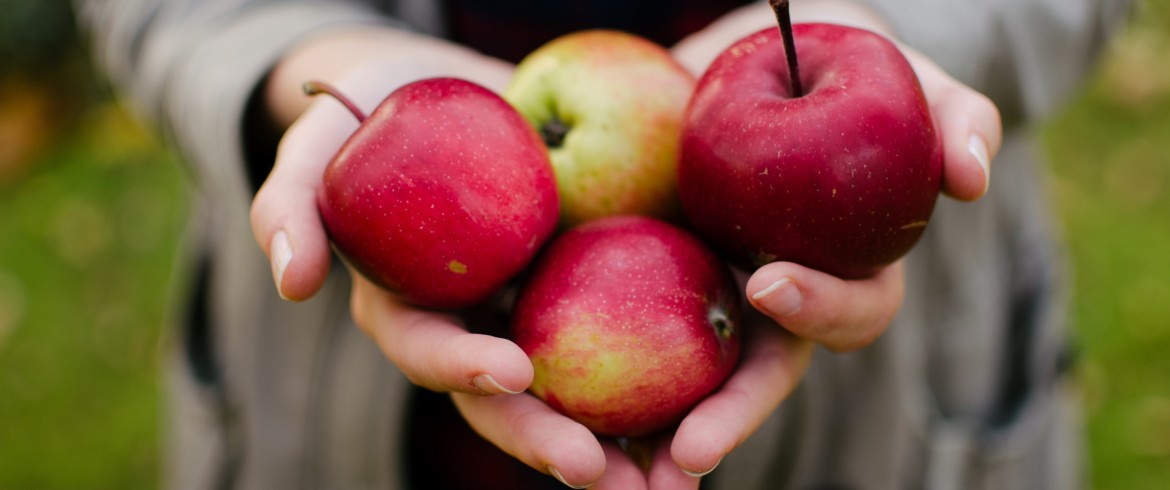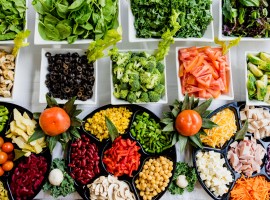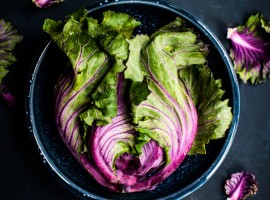A recent research confirms the importance of choosing a healthy diet, not only to help ourselves, but also to fight climate changes. Let’s see what scientists say and which rules we should follow at the table to protect our (and the Planet’s) health.
Diet is life: Every day, we need different amounts of water, oxygen and food. By choosing a healthy diet, we can prevent chronic cardiovascular diseases and reduce environmental impacts and greenhouse gas emissions, improving our Planet’s health.
Did you know that one of the main causes of CO2 production comes indeed from what we put on our tables every day? If we consider greenhouse gas emissions, it’s the food industry that contributes the most to climate change, producing 31% of the total amount (a higher percentage than transport or heating systems’).
That’s why the consequences of our food habits on our Planet’s health can be devastating. A recent research of the Oxford University proves it: let’s take a look together.
Our diet’s impact on the environment
Diet plays an important role in humanity’s and the Planet’s fate. Food constitutes the 32% of the fundamental resources that our bodies need to live. Food production only accounts for the 25% of the total environmental impact.
A recent research made by the Oxford University together with Agroscope, the Swiss Research Institute on Agriculture, was published on the scientific magazine Science. It clarified our diet’s impact on the Planet.
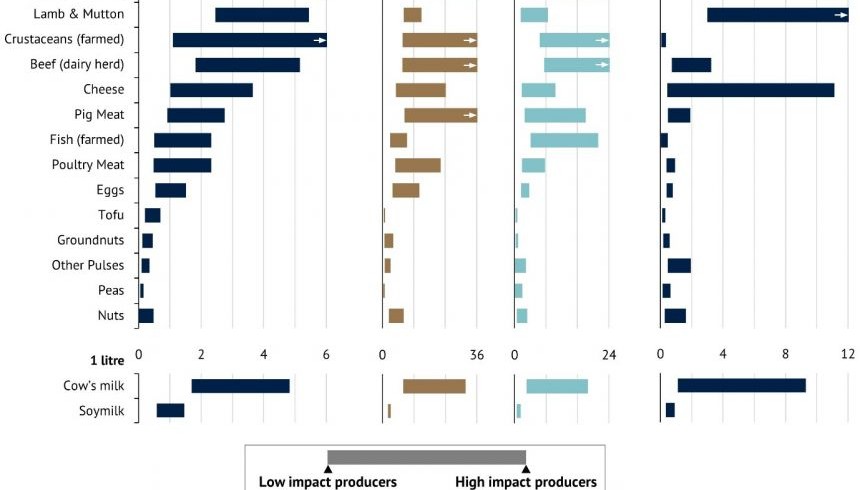
The graphic elaborated by the researchers shows the impact of 15 food products, 9 derived from animals and 6 of vegetable origins considering a sample of 9,000 companies located all around the world.
The study analyzed a wide section of the food industry. Researchers considered the impact of 40,000 companies, 1,600 processing plants, the types of packaging and the ways adopted by retailers. The enormous quantity of information collected led to the creation of a huge database. That made it possible for researchers to establish which are the geographical areas that are affected the most by production techniques and the 40 most consumed foods in the world.
According to scientists, among the various sector of food production, meat industry is the most devastating for our Planet. That happens, however, in varying degrees: the bigger the producer, the greater his impact.
Intensive production impoverishes the environment and our diet
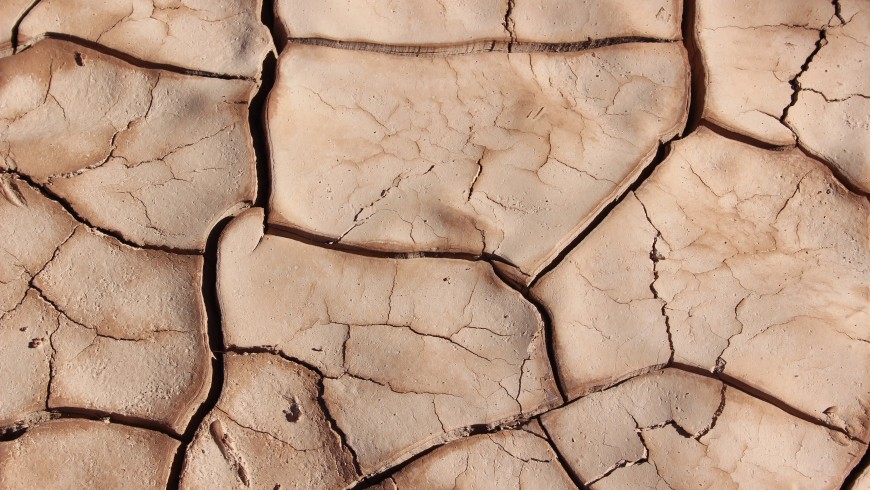
Moving to figures: Those who produce intensively beef use 370 m2 of land to obtain 100 g of proteins, emitting up to 105 kg of CO2. On the contrary, a low-impact producer can reduce from 12 to 50 times emissions and soil’s exploitation. Instead, to produce the same amount of protein, a beans producer needs only 1 m2 of soil. Emissions fall to nearly 0,3 kg, including transportation.
However, it seems that also aquaculture is not completely safe for our environment’s health. The quantity of methane placed in the environment passes the impact of the carbon dioxide produced by cattle farms.
Reading data about the production of vegetable foods, we can discover interesting things. A simple beer, for example, can have a noticeable impact on the environment. Anyway, we must say that it depends on the production techniques: some beer producers manage to reduce their impact up to 4 times less than others do.
Considering all of this, the one who pays the higher price is the environment. In fact, in addition to damaging emissions in the air we breathe, water springs too end up being heavily compromised. An example is the overabundance of nutrients and its acidification.
Anyway, considering the reduction margin of the impact depending on the production techniques used, one thing is certain: foods derived from animals pollute more than foods of vegetable origins. Another example that speaks for itself: to produce a liter of a soy-made beverage we need only a half of the resources used to produce milk.
Healthy diet for us and for the Planet
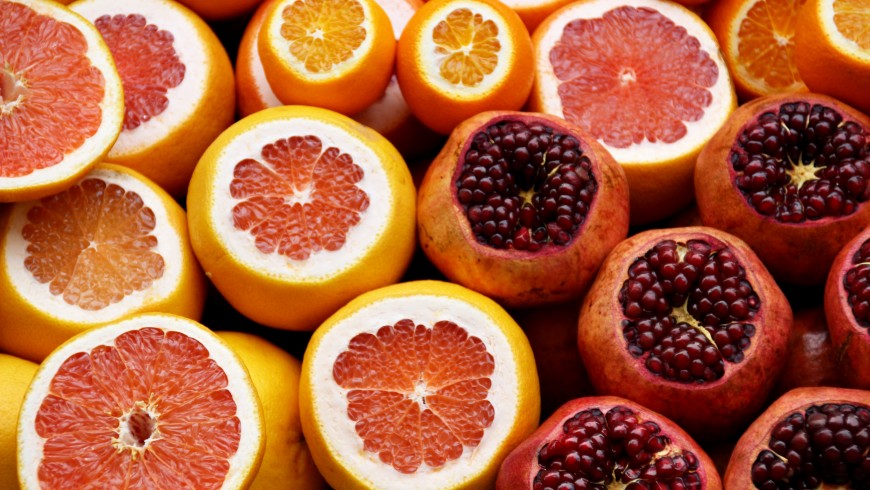
- Photo by Brooke Lark on Unsplash
- Photo by Dan Gold on Unsplash
- Photo by Monika Grabkowska on Unsplash
Mens sana in corpore sano. Never like today, has the advice of the ancient Latin writer Juvenal been more up to date. We must say that back in the Latins’ days the environment was healthier. What can we moderns do today to copy our predecessors’ glories?
Firstly, we all must make an effort and take care of ourselves. It’s clear now that many foods damage not only the environment, but also ourselves. We should turn upside down the belief that food is only fuel for our bodies: food is only and especially prevention.
To understand what we said above we don’t have to look that far: an excessive consumption of beef could lead our bodies to diseases. Tumors, high cholesterol, cardiovascular problems. The same goes with an excessive use of sugars, alcohol or food rich in saturated fats.
A healthy diet not only is good for our bodies, but also improves our Planet’s health. A mainly vegetarian diet can reduce greenhouse gas emissions up to 73% and soil exploitation up to 76%, and it’s perfect to maintain a healthy and balanced lifestyle. It’s poor in saturated fats, provides low-impact proteins, takes care of our heart and fights obesity. We must not forget that animal food industry is full of hormones and antibiotics too. In front of this actual disaster, a vegetarian diet is the essential remedy. To free our bodies from these damaging substances and gives new impetus and vitality to our health.
Healthy diet: 10 rules to save our Planet at the table

How to respect the Planet at the table every day? Here’s 10 simple rules we all should follow:
1. Reduce meat consumption
Too much meat causes cardiovascular problems and its environmental impact is devastating. In addition, too often the industry guarantees no dignity to animals.
2. Choose seasonal products
Fruits and vegetables have their seasonal properties: That’s why is important to eat them at the right moment. And their production doesn’t require any particular energy consumption.
3. Buy local food
Local products are a guarantee of freshness. If you choose typical products and local varieties, you’ll help the local economy and small supply chains.
4. Choose local fish
Often the fish that we find is bred and imported from other parts of the world. If we pay attention to the fish we buy, we can reduce the environmental impact of its production and transports.
5. Reduce food waste
Wasting food means wasting natural resources. Too often, we buy more than we need and consume. Writing a list and checking expiring dates can help us to save money and resources.
6. Eat biological products
By choosing biological products, we say no to the use of chemical agents and pesticide. It reduces drastically the danger of soil and water contamination. Biological foods are often healthier and tastier!
7. Avoid packaged products
Around 40% of waste is made of packaging. When it’s possible, our advice is to opt for bulk or on tap products.
8. Avoid food excessively processed
These foods require much more energy than they give. Choosing an apple rather than a packaged snack will surely help more our health.
9. Drink tap water
The use of plastic bottles could be justified only when tap water is undrinkable. By reducing the purchase of plastic packaging, we can truly help the environment.
10. Check the labels!
Always more products are getting environmental certifications. That allows the producers and us to monitor more carefully the impact of what we have on our table.
And what do you think about it? Which good diet habits did you adopt?
Tell us in the comments section below. To give new life to our Planets we need everybody’s help.
Cover photo: photo by Aaron Blanco Tejedor on Unsplash.
